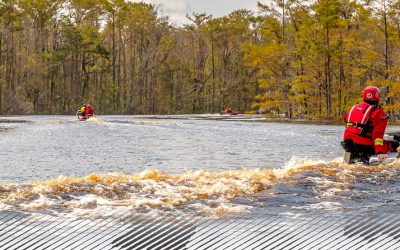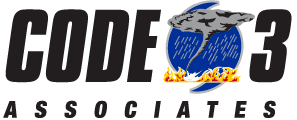

ANIMAL DISASTER RESPONSE TRAINING
Code 3’s National Response Team Training
Certified Animal Rescue Training
Are you looking to meet the FEMA Resource Typing guidelines for Animal Control Officers and Animal Search and Rescue Technician? Look no further than our Animal Disaster Response Training branch, now offering awareness and operations-level training. Our courses cover many focus areas, including small animals, large animals, and non-traditional species. With nationally recognized partners like ASAR Training and Response and Rescue 3 International, our training program is your one-stop-shop for field training skills.
Our curriculum includes classroom presentations, discussion-based workshops, and hands-on practical applications to build on past work experiences. Start with our Code 3 training to cover all prerequisite training and advance your skills to become an expert in animal disaster response. Please note that some courses may have prerequisites to ensure safety and enhance your knowledge and skill base. Join us today and take the next step in enhancing your animal disaster response skills!
Animal Disaster Response Training
Code 3’s National Response Team Training
Certified Animal Rescue Training
This field focused training branch, most commonly known as Animal Disaster Response Training, is designed to now offer both awareness and operations level training to professionals that want to meet the FEMA Resource Typing guidelines for Animal Control Officer and also Animal Search and Rescue Technician. Start with Code 3 training to cover all of your prerequisite training; and work your way through additional nationally recognized training partners like ASAR Training and Response and Rescue 3 International. Whether your focus is small animal, large animal, Haz-mat, or non-traditional species, your one-stop field training skills start with Code 3!
Courses and curriculum incorporate classroom presentations, discussion-based workshops, and hands-on practical application to build on student’s past work experiences. Some of the courses may have a prerequisite to ensure a student’s knowledge and skill base for safety.

EXPERIENCE
“Excellent presentations and instructors were experienced and knowledgeable.
—Kim K.
Classes Include
Click on the course name for description and details.
½ Day (4 hours)
Search and rescue for human safety and animals in disaster situations is a comprehensive course to equip students with the essential knowledge and skills to effectively respond to emergencies and ensure the well-being of humans and animals.
In this course, students will explore the fundamentals of search and rescue, exploring the latest guidelines and training techniques related to Animal Search and Rescue ASAR. We will also introduce the groundbreaking federal resource typing standards for animal response, which provide a more integrated approach to emergency response efforts.
The curriculum is designed to empower students to seamlessly integrate animal responders with traditional response teams, fostering collaboration and synergy in times of crisis. Through engaging lectures and interactive activities, participants will gain a deep understanding of the critical role animals play in disaster response and recovery.
1 Day (8 hours)
At our Emergency Animal Shelter Training, you will learn how to be prepared for any disaster that may affect your area. We will cover the types of disasters that can occur and the problems they can cause. You will also learn about different sheltering options and how to set up a shelter. We will teach you how to work with volunteers, manage supplies and donations, and cater to dietary needs. Additionally, we will cover procedures for tracking animals, basic health protocols, custodial responsibility, and laws that may affect the ASAR responder, humane or animal control officer.
Our Emergency Animal Shelter Training is designed to be interactive and engaging. You will participate in tabletop exercises and learn how to develop co-located and intake facility development for displaced animals. We will also provide you with proper documentation associated with planning financial and logistic needs during the event.
Don’t wait until it’s too late.
½ Day (4 hours)
This animal behavior and handling course provides instruction on the safe handling of small and non-traditional animals that are under stress, using humanely acceptable techniques. Through class instruction and hands-on exercises you will learn common behavior, body language and flight zones, handling precautions, fear and aggression warning signs, signs of stress, methods of capture and restraint used by the responder.
Equipment needed: Gloves, sturdy closed-toe shoes or boots.
½ Day (4 hours)
This class will cover the commonly encountered zoonotic organisms that may be hazardous to responders and animals as well as specific diseases that could be used in bio-terrorism. Emphasis will be placed on what is normal and how to recognize what is abnormal. Personal protective equipment (PPE) and biosecurity will be demonstrated.
2 Days (16 hours)
BULL (Big Useful Livestock Lessons) is designed to equip rescuers with the skills and knowledge needed to handle large animals in emergency situations safely. Regarding small companion animals, rescuers are often confident in their abilities. However, when faced with an animal up to ten times its weight, additional strength and expertise are required.
Our comprehensive training program combines classroom instruction with hands-on experience, providing participants the tools to handle large animals effectively. Through this program, students will learn how to safely approach and handle large animals, modify and utilize their existing rescue equipment, and identify specialized equipment to enhance rescue efficiency. Additionally, participants will gain insights into rope and harnessing systems that can be employed to move large animals, as well as post-rescue protocols.
To ensure a safe learning environment, participants must bring their own gloves, sturdy closed-toe shoes or boots, and a helmet. These essential items will help protect against potential hazards during hands-on training sessions.
We understand the importance of collaboration in emergency situations, and this training program fosters a sense of teamwork and cooperation among rescuers. By building strength and skills to handle large animals safely, we can work together to provide the best possible care in challenging situations.
Join us for this transformative training experience and become a confident and effective rescuer in the face of large animal emergencies.
Click here for a full description of the BULL class.
1 Day (8 hours)
Our hands-on animal rescue ropes training class provides the best practices for rescuing large animals in emergency situations. In this course, you will learn about rope terminology, common knots, and their applications. Our experienced instructors will guide you through practical animal rescue scenarios, helping you develop proper animal handling techniques, harnessing systems, and extraction techniques for low-angle rope rescue.
To participate in this training, you must have the following equipment: leather-palmed gloves, work-type boots with ankle support, and a helmet with a 3-point chin strap approved by NFPA/UIAA. Our course is designed to give you the knowledge and skills you need to handle animal rescue situations with confidence and efficiency. Join our training class today and become a valuable asset in your community’s emergency response team.
½ Day (4 hours)
Laying out an ASAR operation or daily duties, whether in an urban or rural environment, is challenging. This class will orient you to the basic uses of a GPS unit, compass and maps to navigate new locations. Students will work through practical situations using a map and compass in a new environment. This class examines the basics of both road maps and topographic maps used in emergency situations.
Practical scenarios will differ given class locations. Map and compass provided.
1 Day (8 hours)
Materials hazardous to animals and humans can come in many forms for responders. In this course you will be given technician level instruction in identifying sources of contamination, how to recognize different types of hazardous materials, decontamination and what personal protective equipment (PPE) to use.
This six-hour course is designed to equip animal responders with the basic knowledge and safety skills required to integrate with firefighters within the urban interface of Wildland Fire. The curriculum also provides seasoned firefighters insights into animal rescue during fire events. Instruction includes relevant studies from S-190 Introduction to Wildland Fire Behavior and S-130 Firefighter Training.
The course is intended for fire, rescue, law enforcement personnel, animal control officers, livestock professionals, veterinary professionals, and others who may be called upon to assist during Wildland Fire incidents.
Upon successfully completing the curriculum with a cumulative average score of 80% or above, students will receive a certificate of completion and be eligible to apply for continuing education credits (CEUs) from Colorado State University. Veterinary professionals can also apply for CEUs from Colorado State University Veterinary Teaching Hospital.
We encourage all eligible individuals to take advantage of this opportunity to expand their knowledge and skills in animal rescue and safety during Wildland Fire incidents.
The training comprises animal emergency management issues focusing on the urban interface during wildland fire events.
8 Hours
Our Trailer Safety and Skills Course is designed to cater to students of all levels of trailering ability. This comprehensive class is specifically tailored for emergency responders, livestock haulers, CART members, humane or animal control officers, and anyone involved in the transportation of livestock.
In this course, students will be equipped with the necessary tools and knowledge to ensure the safe and efficient hauling of livestock. The curriculum covers essential topics such as conducting pre-trip vehicle checks, understanding the importance of speed management and braking distance, and conducting thorough trailer inspections.
One of the highlights of the course is the vehicle safety and trailer driving skills test, which is required for obtaining a certificate. During this test, students can demonstrate their proficiency in handling their own vehicles and trailers. To ensure success, our experienced instructors will guide students through basic maneuvers at the practice stations before the test.
We take pride in the rigor and practicality of our training program, and as such, passing the skills test is a mandatory requirement for receiving the certificate. This ensures that our students have not only gained the theoretical knowledge but also the practical skills needed to excel in their profession.
Join us for the Trailer Safety and Skills Course and take your trailering abilities to the next level.
1 or 2 day (8 – 16 hours)
Hands on animal rescue training class covers the awareness level and current best working practices of rescue boat operations while adding real world applications. Students will learn about basic flood disaster management and will gain experience navigating flatwater and obstacles. This training includes the handling of small boats by paddle, oar, and on tether.
Equipment required: PFD, Helmet with 3-point chin strap approved by NFPA/UIAA, Water shoes, season appropriate water clothing.
5 Days (40 hours)
DROP is a training course tailored for first responders, animal control officers, law enforcement, and other professionals involved in emergency or disaster response where animals are affected. This immersive and hands-on course aims to equip participants with the necessary skills and knowledge to efficiently and safely respond to emergencies involving animals.
The course provides a comprehensive introduction to the complexities of animal-inclusive emergency response. Participants will gain a deep understanding of the additional variables that arise when animals are involved in emergency situations. Through real-life scenarios and practical applications, participants will learn how to handle and rescue animals in various situations.
Participants will benefit from the expertise of our experienced instructors and will have the opportunity to apply their learning in a simulated disaster response environment.
To ensure safety and preparedness, participants are required to bring specific equipment, including gloves and boots for water, a dry suit, a water/safety approved helmet, an approved personal floatation device (PFD), sturdy hiking boots or work boots, heavy/sturdy gloves for rope work, and clothing appropriate for adverse conditions (no shorts).
We invite all professionals involved in animal-inclusive emergency response to enroll in this unique and essential training course. Together, let us enhance our capacity to effectively respond to emergencies and ensure the safety and well-being of humans and animals.
1 Days (8 hours)
The BARNS course is designed to provide emergency management personnel, disaster responders, and community volunteers with comprehensive training in Emergency Large Animal Sheltering. With a focus on building a solid foundation, this course equips teams with the necessary tools and knowledge to effectively manage and operate emergency shelters for large animals.
Participants will gain a deep understanding of the key principles and best practices in emergency large animal sheltering followed by a tabletop exercise.
By completing the BARNS course, participants will not only enhance their individual skills but also contribute to the overall preparedness of their communities. Together, we can build a strong network of emergency responders equipped to provide effective and compassionate care for large animals during times of crisis.
1 Day (8 Hours)
SAFE (Shelter and Animal Field Emergency) course, designed to provide emergency management professionals, ACO’s, shelter managers, first responders, animal emergency response teams, and volunteers with the essential knowledge and skills needed to effectively handle emergencies and ensure the safety of humans and animals.
In this comprehensive course, participants will gain a solid foundation in emergency handling and sheltering, equipping them with the necessary tools for a smooth-running and safe operation. Through a combination of classroom learning, practical demonstrations, and hands-on exercises, attendees will develop a deep understanding of key topics such as identifying and building their region’s emergency response capability, emergency sheltering operations for both livestock and small animals, animal behavior and handling, and an animal decontamination overview.
The SAFE course goes beyond theoretical knowledge, providing participants ample opportunities to apply their skills in realistic scenarios. Through tabletop exercises, attendees will have the chance to put their learning into practice, honing their abilities to respond to emergencies effectively.
By completing the SAFE course, agency officials, emergency management teams, and volunteers will be better equipped to handle emergencies, minimizing risks and maximizing safety for all involved. This collaborative learning experience empowers you with the knowledge and skills needed to make a difference in emergency situations. Together, let’s build a stronger, safer future.
Certification
These classes are taught in partnership with Colorado State University for certification. Upon successful completion, students will receive a certificate and are eligible to apply for continuing education credits from Colorado State University. Veterinary professionals may apply to receive CEUs from Colorado State University Veterinary Teaching Hospital. These courses are all ASAR compliant and meet NFPA standards.
Code 3 Associates is an approved provider of content which enhances professional competence and aligns with the 5 domains of the Certified Animal Welfare Administrator (CAWA) Exam specifications. Every hour of training equals 1 CE towards CAWA Recertification.
Many of these classes are accepted by Texas DHS for their ACO certification. If your state requires official approval of training to meet your certification needs, please contact us so we may pursue gaining appropriate approval.

